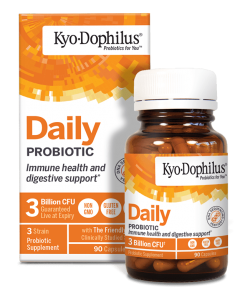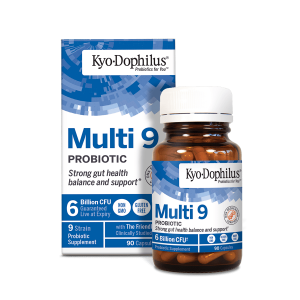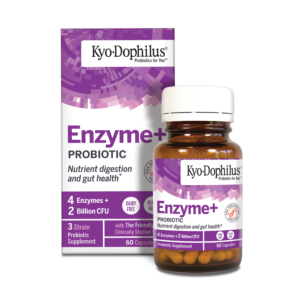Probiotics, native to foods such as yogurt, kefir and kimchi, are popping up everywhere—from smoothies to supplements. But what exactly can they bring to the table? Here are the top 7 science-backed health benefits of probiotics.
1. Digestive health.
One of the main reasons people turn to probiotics is to achieve better gut health, and for good reason: Intestines contain trillions of bacterial cells, not all of which are friendly, so introducing probiotics into the mix promotes a healthier environment overall. Supplementing with probiotics can help ward off a variety of digestive issues, from constipation and diarrhea to gas and bloating. In fact, two large studies show that probiotics can reduce antibiotic-associated diarrhea by 60 percent[1].
2. Nutrient absorption.
A healthy gut is key to getting the most out of the foods and vegetables we eat. Studies show that taking probiotics during meals can increase the body’s absorption of iron[2], for example, which can reduce the risk of this common nutrient deficiency. Probiotics also break down food and produce enzymes that aid in absorption of nutrients and vitamins.
3. Women’s health. [3][4]
A common folk remedy for addressing candida albicans imbalance is to eat or topically apply yogurt, and it may not be too far off. Experts say that probiotics may help manage bacterial imbalances all over the body—including the delicate balance necessary to maintain vaginal health—with research showing benefits for other vaginal bacterial imbalances.
4. Immune health.
Because the intestines house about 70 percent of the body’s innate immune function, boosting friendly bacteria in the gut benefits the body’s ability to fight off not-so-friendly bacteria. Research shows that probiotics can cut the duration and severity of cold symptoms, and lead to fewer missed days at work or school.
5. Brain health.
Research on the so-called gut-brain axis is in its infancy, but scientists are already beginning to understand that gut flora can have a measurable impact on brain activity and mood. One paper, published in 2011, shows that probiotics can even function as delivery vehicles for potent brain chemicals[5]. For example, lactobacillus and bifidobacterium churn out GABA, a key neurochemical responsible for quieting the mind. Escherichia, bacillus and saccharomyces, on the other hand, produce norepinephrine, the concentration-aiding neurotransmitter.
6. Heart.
Research is still being done on how probiotics support heart health. So far, scientists have found that regular consumption of probiotics in yogurt, fermented and sour milk and cheese and supplements can have modest effects on LDL and total cholesterol, and that eating probiotics regularly may help promote normal blood pressure.[5]
7. Skin.
Skin, which is the largest organ of the body, is constantly exposed to physical, chemical, bacterial and fungal challenges. Studies have shown that probiotics have the potential to help with a number of skin irritations and discomforts.[7]
[1] https://www.health.harvard.edu/vitamins-and-supplements/health-benefits-of-taking-probiotics
[2] https://www.newhope.com/ingredients/probi-probiotics-enhance-iron-absorption
[3] https://www.sciencedaily.com/releases/2014/02/140219075721.htm
[4] https://www.sciencedaily.com/releases/2009/07/090707201132.htm
[5] https://www.newhope.com/node/66550
[6] https://www.newhope.com/breaking-news/probiotics-may-improve-blood-pressure
[7] https://www.ncbi.nlm.nih.gov/pubmed/24364369
This article is for informational purposes only. This article is not, nor is it intended to be, a substitute for professional medical advice, diagnosis, or treatment and should never be relied upon for specific medical advice.




Share this Post